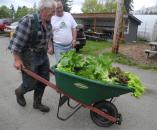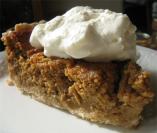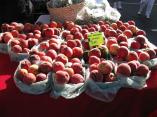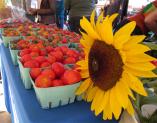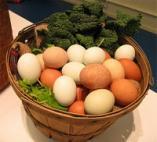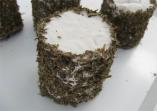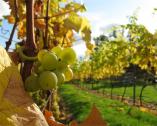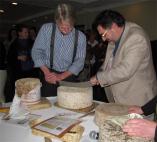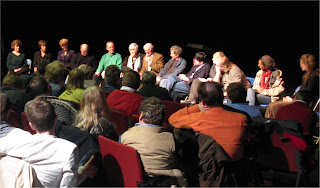I’ve just finished reading a book I started ages ago, The Way We Eat: Why our food choices matter, Peter Singer/Jim Mason. Now I’m cogitating about protein consumption, meat sources and humanitarian practices around meat production. And I listened again to a recent Food Programme episode on quality meat while I was thinking, which – among other things – revealed some ugly truths about how supermarket buyers choose the meat they sell us.
Overwhelmingly, the meat available to Canadian carnivores is from factory farms; I see next to nothing of organic or humanely reared meat in my local markets (in truth, I’ve see none at all, but I want to leave a margin for error in case there is the odd token item somewhere I hadn’t noticed).
Why should this matter? If you read Singer & Mason’s book (or any other piece of writing about factory farming), you’ll learn the following about factory-farmed meat:
“…it inflicts prolonged suffering on sows who spend most of their lives in crates that are too narrow for them to turn around in; on caged hens; on chickens kept in unnaturally large flocks, bred to grow too fast, and transported and killed in appalling conditions; on dairy cows who are regularly made pregnant and separated from their calves; and on beef cattle kept in bare dirt feedlots.”
From a consumption point of view, the meat quality is not good either. Antibiotics fed to meat animals, as well as hormones and inappropriate feed all make the meat we’re sold unhealthy. The people working in Canadian slaughterhouses tend to be poorly trained and badly paid to do a job nobody wants, and to do it for speed rather than with considerations of compassion to a fellow creature. Demand for organic meat and dairy means that there now exists the unlikely enterprise named ‘organic factory farm‘ where the feed is organic but the rearing may be just as brutal as on regular factory farms.
There’s an environmental issue too, of course, identified decades ago by the likes of Frances Moore Lappé, which is that meat production is simply unsustainable on our crowded planet: meat costs the world dear in the excesses it requires of water, land, cereal crops and fossil fuels; the methane produced and the soil erosion and pollution caused by beef farming are a whole other area of concern. Anyone who’s worked in a restaurant or supermarket can attest to the amount of meat our spoiled Western diners simply waste.
In Canada, we have no federal labelling that would identify meat as humanely reared. Small producers, who would be more likely to raise their animals with care and kindness and have them slaughtered by smaller, kinder abattoirs, have been sucker-punched by the BC government who instituted new slaughterhouse regulations aimed at large industrial operations but which are financially insupportable by small scale operators.
Considering the public costs of unhealthy eating (through health care and taxes), and offering a pretty painless and practical solution, Singer & Mason observe:
“The average American today eats 64 pounds more meat, poultry and fish a year than his or her counterpart in the 1950s. That’s almost a 50 percent increase – and Americans were not undernourished then… Choosing an unhealthy diet may seem like a personal choice, but it’s not fair to the people who ultimately have to pay for it. If Americans were to cut back to the meat-eating levels of the 1950s, that would improve health and slash health care costs. It would also reduce the number of animals suffering on factory farms by about the same amount as if roughly 80 million Americans became vegans.” (Emphasis mine)
I found that so encouraging, and so simple! We can have a vegan effect without even being vegan!
Acknowledging that the scale of the wrong we are trying to right in our food choices is simply staggering to most of us, they kindly add: “When we feel overwhelmed, it is important to avoid the mistake of thinking that if you have ethical reasons for doing something, you have to do it all the time, no matter what… Ethical thinking can be sensitive to circumstances.”
They do urge us, though, to make our voices known regardless: what companies and governments don’t know bothers us, they have no reason to change.
Another cheering observation they made is in quoting the position of the American Dietetic Association on vegetarianism, and the specifics of the human need for protein:
“Plant protein can meet requirements when a variety of plant foods is consumed and energy needs are met. Research indicates that an assortment of plant foods eaten over the course of a day can provide all essential amino acids and ensure adequate nitrogen retention and use in healthy adults, thus complementary proteins do not need to be consumed at the same meal.”
So the bottom line is: if factory farming disturbs you for ethical or health or environmental reasons, which I think it should, you can do something about it by making a conscious effort to cut your meat consumption. You don’t have to cut it all, or all at once, but you really can make a difference by cutting it regularly to some degree. You can also pester your supermarket, if that’s where you shop, for some action on organic and humanely reared meat: if we don’t buy it, they can’t sell it.
But if you, he, she, they never say anything to anyone about it, there’s no reason for factory farms to stop doing what they’re doing.
